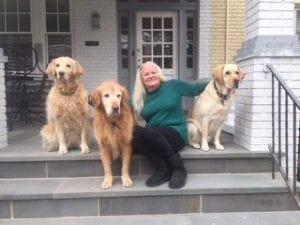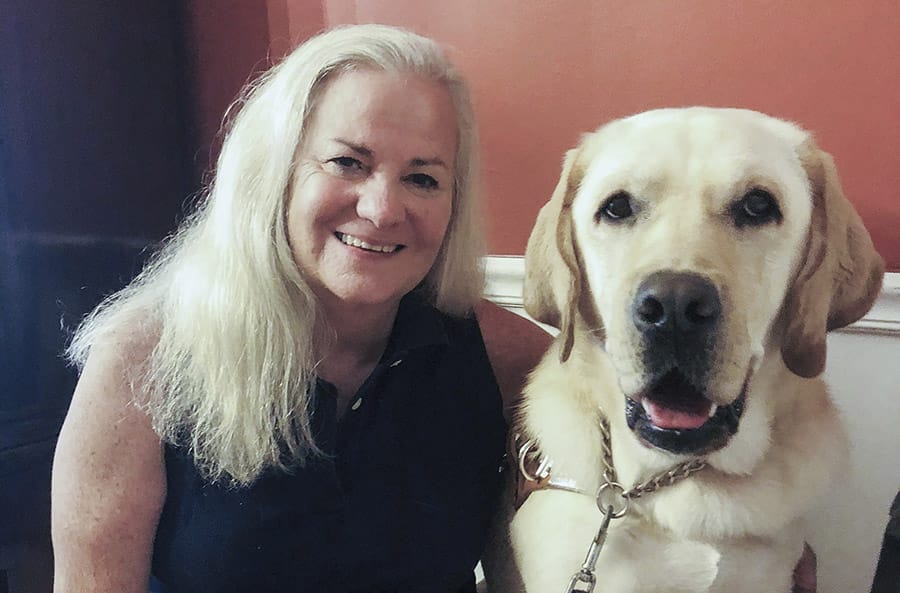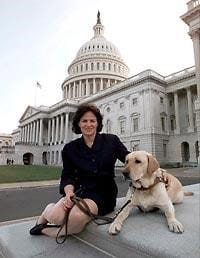Part 2 of 3
Harvard
My undergraduate degrees were in economics and international relations. I joined the federal service and worked in international trade and international labor. My dream had always been to go to the Harvard University John F. Kennedy School of Government (HKS). I had been an average student in college and standard exams like the LSAT and GRE were no friends of mine. I also did horrible on my SATs. I had gone to HKS one time to check it out and was totally intimidated.
In 2001 I married the most wonderful man in the world. It also happened that he got his graduate degree from Harvard School of Education. He knew of my dream and encouraged me to apply. I reached out to the office of Students with Disabilities, spoke with a wonderful woman who, after hearing of my background, encouraged me to apply. I told her that the standard exams would be to my detriment and the Dean of Admissions waived them for me.
I applied, a month later I got a call at work informing me of my acceptance. I was shaking and trembling with excitement.
A few months later I found myself at Harvard for summer classes in macroeconomics and quantitative analysis. I was stumped; I could not see the whiteboard. These classes were not graded. Midway I decided to focus on macroeconomics and accepted the fact that I could not overcome the challenges I was facing in quantitative analysis. I hired a macroeconomics tutor to better understand the mappings on the whiteboard. I did well in this class, but not great in quantitative analysis.
My class was comprised of 250 students. Half of the class were international students from China, Japan, Armenia, Congo, Brazil and Germany. Many of the international students had never seen a blind person, much less a blind person with a guide dog in a classroom. I was overwhelmed initially in this environment because I had so many people to convince that I could succeed. My guide dog Owen was my “Mr. Perfect” as he got the routine and took me to my classes. The classes were 80 minutes long and after 75 minutes Owen would get up, do a big shake, and let the professor know to wrap up the class.
My 10 months went by too quickly. Graduation day had arrived. The day before graduation I practiced with Owen to go across the stage to receive “our” diploma. Our row was called out and Owen and I lined up at the bottom of the stairs. Our turn came to go on stage and the crowd burst into applause as my classmates gave us exceptional recognition of our work.
My classmates then dispersed to all corners of the world to take on leadership roles in their countries. I hope that I have taught them that people with disabilities, if given the chance, can not only succeed in life, but can thrive.
Part 3 of 3
Solo Travels
 I love to travel. I thought once I lost the last of my vision that it would no longer be as pleasurable. I had retired and my husband was still working. I was feeling a bit of social isolation. So, when he had time off, we would go on trips. One time we went to South Beach in Miami. The hotel was great, and I got to know the hotel manager. It was on the beach with lots of places to walk to. Finnegan turned out to be a rock star in the hotel. The streets were full of pedestrians. People were from all over the world, Australia, Israel, Britain and Germany. I was scoping this all out and said to my husband, “you know, I think I could come back here by myself.” The following winter I did go back for a few days. The staff remembered Finnegan and gave us a warm welcome. In the mornings I would walk a few blocks to a small coffee house for breakfast. If I got turned around, I would ask someone of assistance. The staff was very helpful in getting me set up on the beach with a chaise lounge and umbrella. Finnegan and I would just hang out as I would listen to a book on my phone.
I love to travel. I thought once I lost the last of my vision that it would no longer be as pleasurable. I had retired and my husband was still working. I was feeling a bit of social isolation. So, when he had time off, we would go on trips. One time we went to South Beach in Miami. The hotel was great, and I got to know the hotel manager. It was on the beach with lots of places to walk to. Finnegan turned out to be a rock star in the hotel. The streets were full of pedestrians. People were from all over the world, Australia, Israel, Britain and Germany. I was scoping this all out and said to my husband, “you know, I think I could come back here by myself.” The following winter I did go back for a few days. The staff remembered Finnegan and gave us a warm welcome. In the mornings I would walk a few blocks to a small coffee house for breakfast. If I got turned around, I would ask someone of assistance. The staff was very helpful in getting me set up on the beach with a chaise lounge and umbrella. Finnegan and I would just hang out as I would listen to a book on my phone.
I felt so liberated being able to travel to South Beach. The following year I started to think about going to Europe by myself. I found a tour company which sounded interesting. I picked the tour “Hiking the Hills of Umbria.” I wanted a tour with lots of walking as museums were not going to hold my interest. I got on the flight to Rome. Someone met me as I got off the plane and guided me to the main lobby. Our group tour guide found me immediately.
There would be 10 of us on this tour. All of us were Americans, they were all friendly. I am sure they were wondering how I was going to manage. Finnegan followed the group to the bus. I walked with Finnegan and my suitcase. We loaded on to the bus and drove to our lovely hotel in Umbria.
The first night we did introductions. I told them about working with a service dog. Ignore him, do not speak to him. He would tell me when there are steps. The next day after a wonderful breakfast we loaded on to the bus and drove to the olive fields where we would begin our hike. Every day we went to another town, hiked all morning then stopped for an amazing lunch. Afternoons were spent on our own exploring the towns.
This was the most wonderful trip I had ever been on. The people, food, wine, and lifestyle of Italy just flowed into me. I could not see, but I could experience. This was the first of many trips I would make in the next several years.
I am liberated and independent. I thought my life would be fraught with barriers, but I tried and came out so much more independent.
Find out more about Moira Shea and read the beginning of her story. Thank you for joining us today to listen to a Voice of the Leader Dog Community!


 I am retired from 35 years working for the federal government. I have worked for various agencies. When I was working for the Department of Energy, I applied for a Brookings Institute fellowship to work on Capitol Hill. To my great surprise, I was accepted.
I am retired from 35 years working for the federal government. I have worked for various agencies. When I was working for the Department of Energy, I applied for a Brookings Institute fellowship to work on Capitol Hill. To my great surprise, I was accepted.